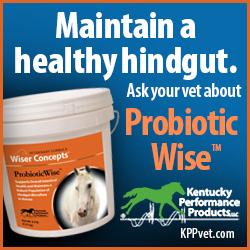
Kentucky Performance Products: Keeping Your Horse’s Gut Healthy
Here are eight easy tips to help you keep your horse’s gut healthy.

Canva/mari_art/CC
It’s important for the healthy and safety of your horse to keep its gut healthy. Here are eight tips from Kentucky Performance Products to keep your horse’s gut how it should be.
1. Supply unlimited water
Provide an unlimited source of clean, fresh water at all times.
2. Make changes slowly
Make all changes in concentrates, hay and supplements slowly over a week to 10 days to allow the microbial population time to adapt.
3. Provide high-quality fiber
Provide high-quality fiber such as hay or pasture and offer it free choice whenever possible.
4. Feed small, frequent meals
Feed concentrates as small, frequent meals. Do not feed more than 4 pounds of concentrate per meal.
5. Keep a consistent schedule
Microbes become accustomed to “eating” at certain times of the day, so not feeding your horse on time can cause the beneficial microbes to die off.
6. Store feed safely
Keep all feeds and supplements in a horse-proof container or feed room to avoid accidental overeating.
7. Provide mold-free feedstuffs
Never feed tainted or moldy concentrates, hay or supplements.
8. Add a digestive supplement
Supplement your horse with high-quality prebiotics and probiotics daily, particularly during times of stress or after antibiotic use. Probiotics and prebiotics help maintain healthy gut tissues and a robust microbiome.

About Kentucky Performance Products, LLC:
Need to sustain a healthy hindgut?
Ask your vet about ProbioticWise™.
ProbioticWise:
- Maintains the healthy population of beneficial bacteria throughout the GI tract
- Supports the restoration of normal GI tract function in horses challenged by diarrhea
- Supports complete digestion of starch and sugar in the foregut, lowering the risk of hindgut upset and pH imbalances (acidosis) that can lead to colic and laminitis
- Supports reduced inflammation levels in GI tract tissues
- Supplies nutrients to the gastrointestinal tissues that support the healing of stomach and colonic ulceration
- Supplies polyphenols, nucleotides, and polysterols—antioxidants that contribute to the maintenance of healthy intestinal cell membrane function
For more information, visit KPPvet.com.






